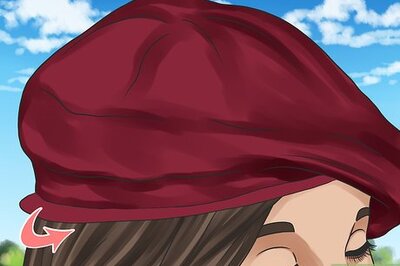
views
Use home remedies to manage mild symptoms.

Most earaches go away with home treatment in a couple days. If you have mild ear pain, the mostly likely cause is a viral or bacterial infection. In many cases, these kinds of earaches heal on their own, with no need for medical treatment. Wait 1-2 days to see if you start to feel better. While you’re waiting, focus on treating the symptoms with remedies like hot or cold compresses and OTC pain medications. If you have a baby under 6 months of age and you suspect they have an earache, call your pediatrician right away. Ear infections can be more serious in young babies. Some types of ear infection, such as swimmer’s ear or a severe middle or inner ear infection, might require treatment with antibiotics to clear up. If you have severe ear pain, or if it lasts longer than 2 days, get your ear evaluated by a doctor to determine the right treatment.
Soothe pain with a hot or cold compress.

Choose whichever temperature feels best to you. Both cold and heat can be soothing for this kind of pain, so it’s a matter of personal preference which one you use. Wrap an ice pack or a hot compress (such as a hot water bottle or heating pad) in a thin towel or cloth and gently hold it against your ear. Don’t put it directly against your skin, since it could cause burns or frostbite. If you use an electric heating pad, set it on low. Don’t use a heating pad on a child’s ear. With a warm compress, you might feel earwax trickle out of your ear. It’s normal for the wax to melt when you expose it to heat. Don’t use ice or heat on your skin for longer than 20 minutes at a time.
Take an over-the-counter painkiller.

Ibuprofen or acetaminophen will also reduce a fever. Follow the dosage instructions on the bottle, or ask your doctor for advice. Don’t give any painkillers containing aspirin to a child or a teenager. These medications can cause a rare, potentially fatal condition called Reye’s syndrome in kids.
Sleep with your ear elevated.

Prop your head on pillows with the affected ear up. Some people find that elevating their ear helps reduce painful pressure. Experiment with different positions to see if any of them bring relief. Don't use a pillow to prop up a baby's head. If your child is under 2 and has an earache, try holding them propped upright in your lap or arms until they calm down.
Try decongestants if your doctor says it’s ok.

Sometimes a stuffy nose causes ear pain. If you think your earache is related to a cold, sinus infection, or allergies, give your doctor a call. Ask if a decongestant might help. They can recommend one that will be safe and effective for you or your child. Avoid using decongestants that contain antihistamines unless your doctor specifically recommends them. Antihistamines can sometimes make an ear blockage worse.
Avoid ear drops unless your doctor recommends them.

Putting liquid in your ears could make things worse. You can buy over-the-counter numbing drops, but some people find them more painful than soothing. Additionally, any kind of drops can cause more damage if your eardrum is ruptured or torn. Ask your doctor for advice before putting anything in your ears or your child’s. Steer clear of home remedies, like putting garlic or olive oil in your ear. These treatments probably won’t help with an ear infection, and they could make any damage to your eardrum worse.
Don’t put cotton swabs in your ear.

Anything in your ear canal could irritate it more. Hold off on trying to clean your ears or your child’s ears until you’ve seen the doctor or the symptoms have improved. Don’t try to rinse the ear, either—fluid in the ear could make the problem worse. If you suspect the earache is being caused by a buildup of earwax or some other kind of blockage, see your doctor. They can safely remove the blockage for you.
See your doctor if you’re not better in 2-3 days.

Your doctor can figure out what’s causing the pain and treat it. Ear pain that doesn’t go away in a couple of days might signal a serious infection or some other issue. Your doctor will examine your ear and ask you questions about your symptoms to determine what’s wrong. Ear infections are the most common cause of earaches, but there can be other causes as well. For instance, your pain might be due to an injury in your ear canal, swimmer’s ear, an earwax blockage, or referred pain from a problem in your jaw or throat. Depending on what’s causing your earache, your doctor might prescribe oral antibiotics, eardrops, or some other type of medication. If you think your baby or child has an earache, call their doctor for advice right away. Depending on your child’s age and their symptoms, they might advise you to try home treatments or ask you to come in for a checkup.
Get medical attention for severe symptoms.

Watch for severe pain, swelling, or fluid drainage. Earaches are usually not caused by anything serious, but they can sometimes be a symptom of a more severe infection or injury to the ear. Call your doctor right away if you or your child have any worrisome or severe symptoms along with ear pain. You should also get medical help for an earache with a high fever, a stiff neck, or hearing loss, or if you see anything stuck in the ear. If you are caring for someone with an earache and they are very weak or unable to move, call emergency services or take them to the emergency room immediately. They may have a more serious underlying condition, such as meningitis due to a pneumococcal infection.
Take antibiotics if your doctor prescribes them.

Always finish the full course of antibiotics. If your doctor diagnoses you with an ear infection, they may prescribe oral antibiotics or antibiotic ear drops. Take the medication exactly as directed, and don’t stop before finishing the full course, even if you feel better. If you experience side effects, call your doctor and ask them what to do. They may be able to prescribe a different medication. If you stop taking the medication too soon, your ear infection could come back or get worse. Don’t take antibiotics to treat an earache unless your doctor prescribes them.




















Comments
0 comment